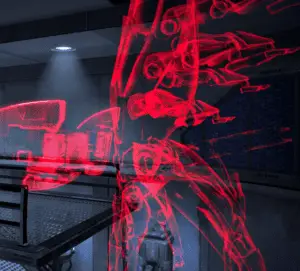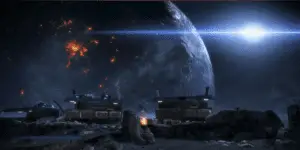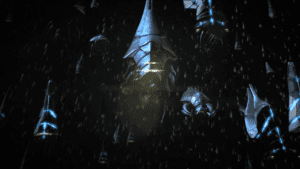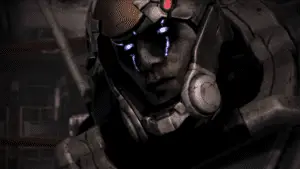As you have likely heard, Mass Effect: Andromeda is officially over. No more content will be released – no patches, no DLC, no expansions, no sequels. We’ll learn about the fate of the Quarian Ark in a comic or novel…someday.
Those who have followed the game’s troubled release won’t find it surprising. The game has gathered its share of criticism. Whether or not it deserved it… I won’t talk about that. I’m going to scroll back. There were those who disliked that Andromeda leaves the Milky Way, even before we knew more. And I’m going to explain why it was never going to be different.
The Mass Effect franchise stirred up a massive storm of controversy with the endings to Mass Effect 3. But, once again… I’m not going to talk about that just yet. Not only because this dead horse is a barely-recognizable smear at this point, but because I want to dig deeper. First, I want to explain why the trilogy’s fate was determined by the core of Mass Effect 1’s plot.
In Mass Effect 1, we meet Commander Shepard, the legendary leader, first human Spectre and a one-person army. As we chase down Saren, a rogue turian spectre, we find out he’s much more than a treacherous government agent. He’s entered the service of the Reapers.

“We impose order on the chaos of organic evolution.
You exist because we allow it, and you will end because we demand it.”
The meeting with Saren’s master, Sovereign, is something every fan of the series remembers. Sovereign’s size, presence and its cold, mechanical voice that proclaims the logical inevitability of our annihilation, are all chilling.
We spend the rest of the game trying to prevent Saren from helping Sovereign take over the Citadel and turn it into a Mass Relay that will let other Reapers into the galaxy. At which point they would exterminate all intelligent life, and leave the surviving species to begin the cycle anew.
From the moment we meet Sovereign and discover the truth, Shepard’s mission has a laser-like focus: stop the Reapers. Sure, we’ll do a whole lot of other things, in the timeless tradition of role-playing games. But the driving goal is the same. Commander Shepard has to stop the Reapers. What else can compare to an ancient race of genocidal god-machines?
The Reapers are just one half, though. The other is Shepard themselves. By choosing to continue their story in Mass Effect 2, the writers inextricably bound the story to them. Mass Effect is about Commander Shepard. Everything else feeds into this very narrow narrative. Even when Shepard isn’t fighting the Reapers directly, they’re preparing to do so – like in Mass Effect 2, when they build a team to stop the Collectors from building a Reaper in the heart of the galaxy.
The problems with this setup become painfully apparent in Mass Effect 3, even before the infamous endings. The hero and the villains of the series belong to entirely different genres. Shepard is a space opera hero, who solves problems by being an awesome space marine in their general direction. The Reapers, meanwhile… I hesitate to use the word “Lovecraftian”, because it’s so overused. But they’re certainly a cosmic threat. The scale they operate on is unimaginable; it eclipses any single sentient being, no matter how exceptional.

Now, don’t get me wrong. I think Mass Effect 3 is an excellent game, before the end. But in retrospect, the discrepancy is clear. The Reapers worked very well when they were a looming, distant threat. Sovereign was a force of nature by itself. In Mass Effect 2, we fought the Reapers’ minions. But in Mass Effect 3, they had to finally come calling. And the game had to reconcile its focus on Shepard’s personal heroic with the threat that had ended countless civilizations before.
And this is where those much-maligned endings come in. I won’t discuss all the ways in which they may have disappointed us. Instead, I will talk about what could possibly have happened next. Which is… well, what could happen next? The galaxy would spend many years rebuilding. How many depends on Shepard’s choices.
Yes, Shepard’s. That is, once again, the clinch. Everything about the original trilogy hinged on Shepard. Their choices shaped the galaxy. That is why people were so mad the original ending seemed to remove them, and why the extended cut expanded on all the consequences.
But I’m going to ignore the actual endings for a while here. My point, after all, is that the departure from the Milky Way was inevitable since the narrative of Commander Shepard against the Reapers emerged. The ending was always going to be some variety of “Commander Shepard defeats the Reapers”. It might not have happened the way it did. Maybe we wouldn’t have learned about the Reapers’ motives, although that would have disappointed many. But it was always going to boil down to this one sentence.
So even if we’d got the dream of many an angry nerd and simply blasted the Reapers to pieces with a big gun, or many big guns, the end result is still the same. A galaxy, rebuilding from a war with the Reapers, that Shepard won.
What does it leave for a future game? Do we stick to Shepard? Even if they’re alive, it would bring the premise of “only Shepard can solve problems” past the point of absurdity – it was getting increasingly shaky already. Do we bring in a new protagonist? A new hero operating in a post-Reaper galaxy would have to try very hard not to feel like a janitor, cleaning up after Shepard. After all, the single largest problem of the galaxy has been solved. Not just a problem – the existential mystery of intelligent life and spacefaring civilization.
That’s a lot of tension it would knock out of a sequel from the start. The biggest victory there was has been achieved, so now we move on to less important things. And that’s without taking Shepard’s choices into account. Each of the endings changes the galaxy in a different way, but again – even if there was only one ending, “blow up the Reapers”… Shepard still makes choices that shape the galaxy.

This is a consequence of a narrative that relies heavily on making choices, but also the hyper-focus on Shepard. Compare that to Dragon Age. This series has its share of problems, and also falls into the trap of choices – we make crucial decisions, but their impact must be lessened for the sequels to work. This takes the form of retcons (Leliana’s potential death, many epilogues in Origins), everything evening out to the same thing (Hawke’s stance of mages and Templars) or being off-screen (the fate of the Feraldan throne).
But it does one crucial thing differently, and that is multiple protagonists. The Warden disappears, and Hawke only has a minor role in Inquisition. Many people took issue with that, but I think they miss the point. In DA, every protagonist is just one major character in an unfolding drama. This allows for much more flexibility as a franchise. The Warden finished their grand story and moved on to other things, so Hawke could enter the stage and play their part in history. And so on.
Mass Effect falls into similar traps, of course. The fate of the Citadel Council, for example. It comes down to more or less the same thing, except that everyone blames Shepard if the Council died. Some decisions, like killing Wrex or the genophage cure, do profoundly shape Mass Effect 3. But in that game, Shepard also decides the fate of entire species – krogan, quarian and geth. So the typical problem of choice-heavy games is compounded by an intense focus on a single hero.
A Mass Effect 4 taking place in the Milky Way would have strained the writers’ ability to dodge around players’ choices beyond reason. What’s the alternative? Spin-offs and prequels? Possible, but tricky. Prequels are inherently risky. Consumers associate them with cash-grabs and they need to work around us already knowing how it will end.
In Mass Effect’s case, there’s also a fairly small room for them, if we want them to involve humans. Humanity entered the galactic society fairly shortly before the trilogy’s beginning. So either they fit it there, or we can’t play humans. Which a great many fans would welcome, admittedly. So it’s perhaps the most realistic option.
Spin-off stories taking place concurrently are a possibility, but it would be hard for them to escape the reputation of being minor bit-pieces as Shepard takes care of the important business Again, we run into the problem of everything being funneled into Shepard and their war against the Reapers.
Even most of the tie-in novels ultimately feed into that, as Cerberus’ ultimate goal is… uh… actually, what was their goal? Controlling the Reapers, I guess, but it’s kind of hard to tell. Anyway, in the end, Cerberus were Shepard’s enemies (and briefly allies) in the galaxy-spanning drama of trying to deal with the dread Reapers. The one book that doesn’t concern Cerberus instead concerns… Saren.

Once again comparing it to Dragon Age, the fantasy series has an overarching plot and mysteries (which boil down to “ancient elven mages” nine times out of ten, but nevermind), but the tie-in novels and comics are free to concern a whole lot of different things. The Fereldan uprising against Orlais, the Orlesian politics, Grey Wardens…
There’s plenty of space for stories taking place in colonies, crime dramas on the Citadel, or gritty gang wars and vigilante justice of Omega and the Terminus Systems. But are they appropriate for a follow-up series to a trilogy as massive as the original Mass Effect? Particularly after the ending controversy? The need to “top” the previous instalment is strong in this genre. Would EA (even setting aside their cartoon villainy) have consented to releasing such a thing? How would the fans have reacted? Such a story would be inherently niche.
It’s a paradox, I suppose, that Mass Effect created a rich and vibrant space opera setting that we wanted to see more of, and immerse ourselves in – but then it only gave us one perspective on it, and made everything serve that particular perspective. The chances of the original Milky Way setting enduring past Commander Shepard were thus always slim. My favorite Mass Effect game in terms of story is the second one, and it’s no coincidence that it puts the Reapers in the background and actually doesn’t revolve around Shepard sometimes.
The focus on Shepard had its upsides – it allowed the series to form strong emotional bonds with characters, ones that resonate until today. But it left precious little space in the galaxy for anything else. Thus, I feel like Mass Effect 3 was always going to be the last of the franchise as we initially knew it. It was Andromeda or bust. Was it the right choice, to continue the series in a separate galaxy? Maybe it would have been better to let the series rest? That’s not something I feel qualified to answer. But that’s the choice I feel BioWare had.

